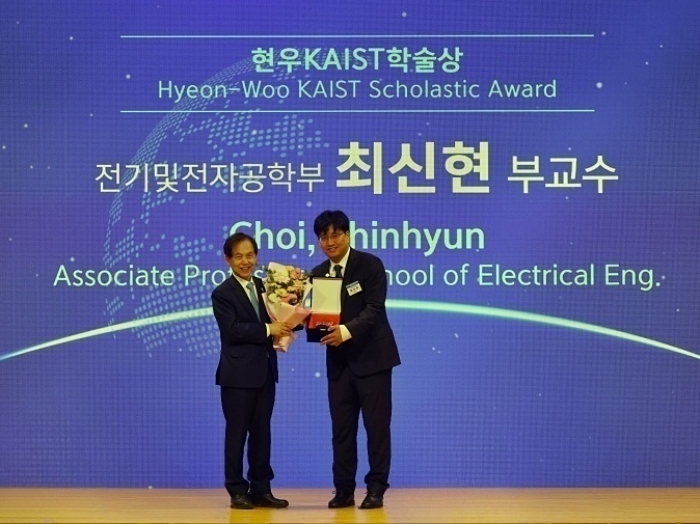
Professor Shinhyun Choi of the School of Electrical Engineering has been selected as the recipient of the Hyeon-Woo KAIST Scholastic Award, hosted by KAIST and sponsored by the Hyeon-Woo Cultural Foundation (Chairman Soo-Il Kwak), in recognition of his achievements in next-generation AI hardware development and innovative semiconductor research.
Professor Choi’s primary research areas focus on the development of future memory and computing devices, including: ▲ Next-generation memory and computing systems using resistive switching devices that are faster and more efficient than conventional methods ▲ Integration with edge computing and neuromorphic computing to enable intelligent computer memory functions ▲Development of more efficient and creative computing and memory device operations, different from the traditional three-terminal transistor structure.
One of his representative achievements is the successful development of an ultra-low-power next-generation phase-change memory (PCM) device optimized for vertical stacking, which reduces electricity consumption by more than 15 times compared to the conventional method that relies on expensive advanced photolithography* processes. * Photolithography: A process that engraves microscopic circuit patterns on silicon wafers for semiconductor chips, which involves advanced technology and high costs.
Furthermore, based on next-generation memory and computing devices, Professor Choi developed new computing hardware (chips) capable of efficiently running AI algorithms, potentially replacing power-hungry chips such as CPUs and GPUs. This achievement enables faster and more efficient data processing and has led to significant accomplishments in practical applications such as smartphones and autonomous driving.
In addition, by analyzing the operating principles of memory devices down to the atomic level based on fundamental physical laws, he has made major contributions in proposing methods to improve memory performance with greater speed and stability.
Professor Choi’s research spans the entire spectrum of semiconductor technology—from material analysis and device development to integrated system applications. His outstanding achievements have been published in top-tier journals such as Nature, Nature Electronics, Nature Communications, and Science Advances.
Professor Choi stated, “It is an honor to receive this meaningful award for my research in IT and AI-related hardware, which are driving major societal changes. I am deeply moved that this research can provide new perspectives to both academia and industry. I will continue to strive to produce research that inspires future scholars and contributes to society.”
Meanwhile, now in its fifth year, the Hyeon-Woo KAIST Scholastic Award was established with donations from Chairman Soo-Il Kwak of the Hyeon-Woo Cultural Foundation to recognize scholars at KAIST who have made outstanding academic achievements. One faculty member is selected each year through a rigorous evaluation by the Hyeon-Woo Foundation Selection Committee and the KAIST Faculty Award Recommendation Committee. The award includes a plaque and a prize of 10 million KRW. This year’s award ceremony was held on April 30 at Jeong Geun-Mo Hall in the KAIST Academic Cultural Complex.